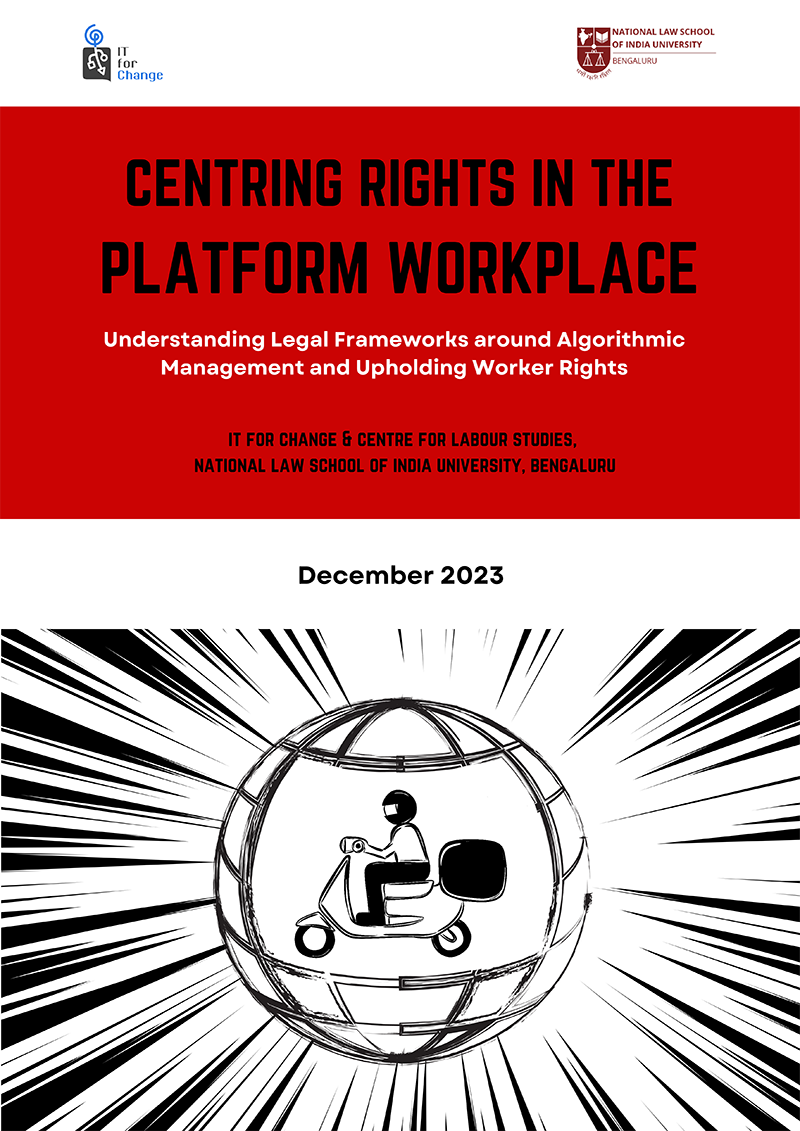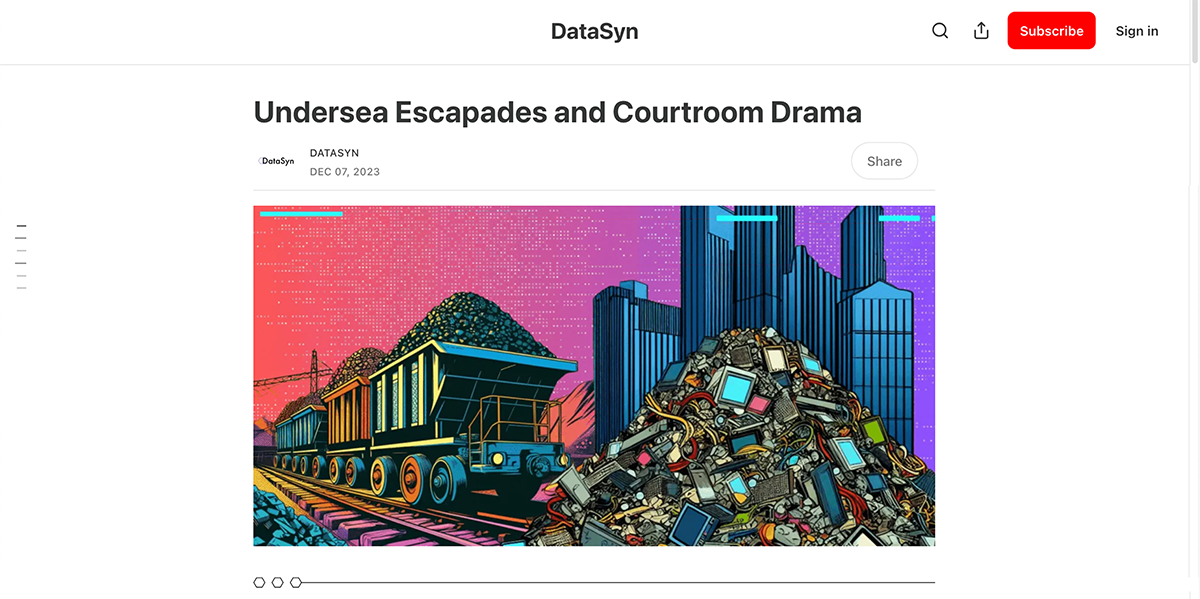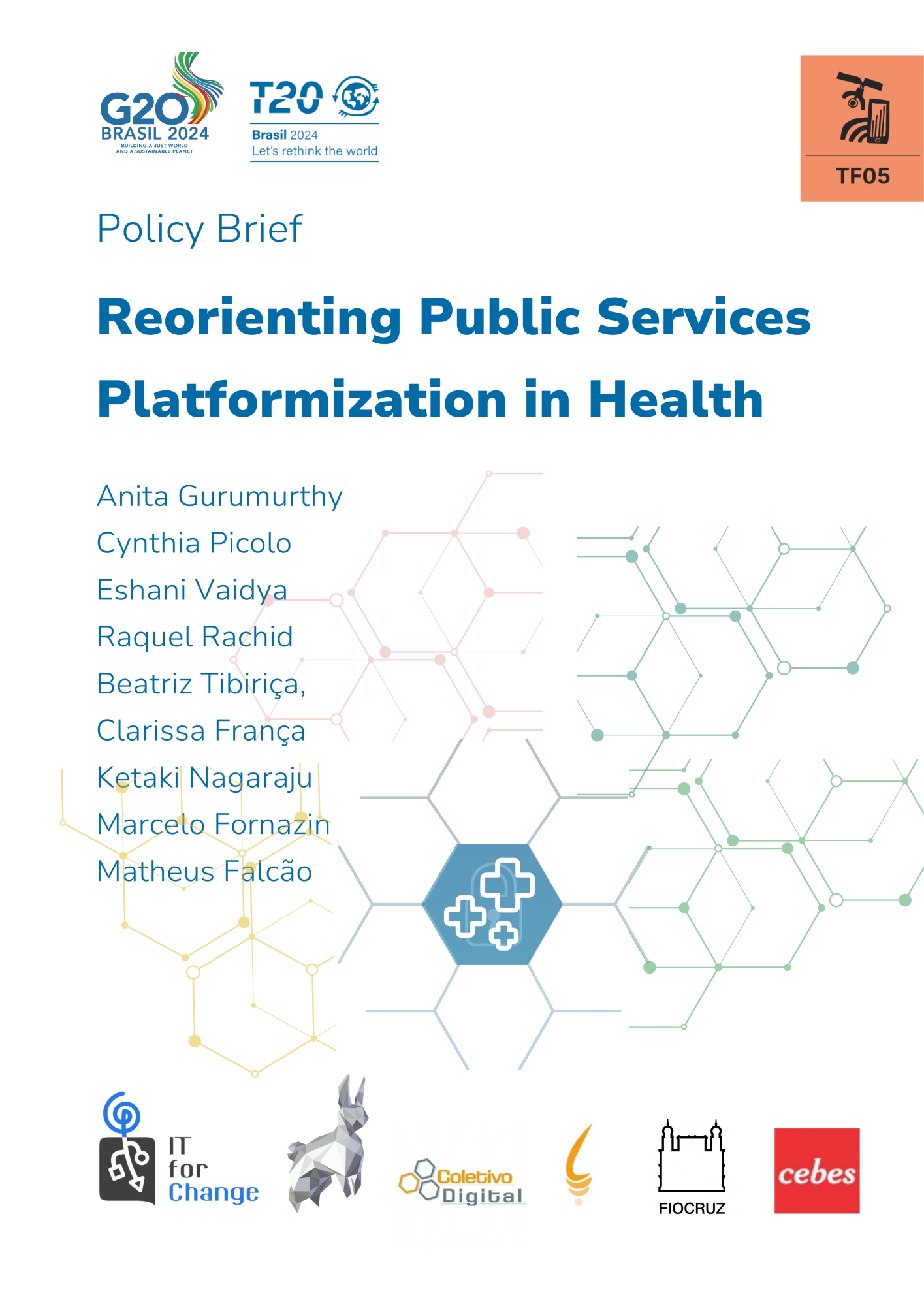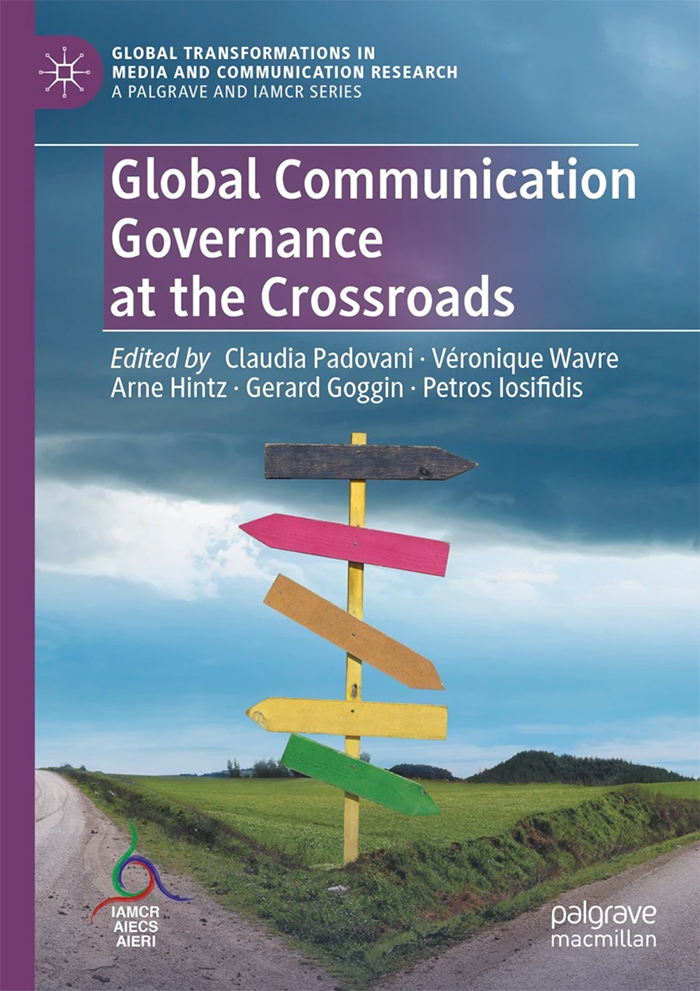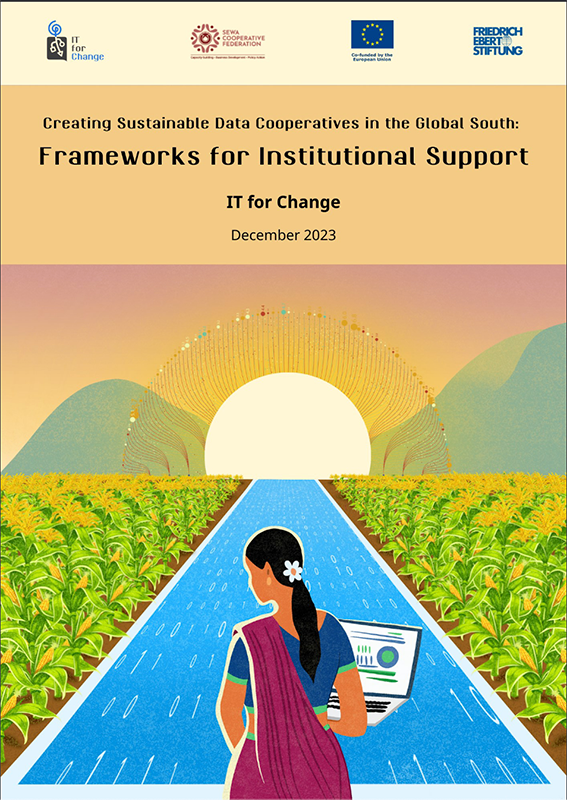Thematic Highlights
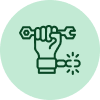
The Future of Work and Workers’ Rights
The rapid growth of the gig economy in the post-pandemic period has intensified worker exploitation and precarity across the globe, particularly in the Global South. Data exploitation and algorithmic work management practices have opened up new quandaries for the realization of decent work. This year, we sharpened our understanding of these transformations in the world of work and advocated for data rights and algorithmic accountability for workers — taking into account the economy-wide proliferation of platform workplaces.
 KEY MILESTONES
KEY MILESTONES
- Contributing to platform work regulation at the sub-national level: We were closely involved in shaping key legislative initiatives related to platform-based work. We provided inputs on the ‘Rajasthan Platform Based Gig Workers (Registration and Welfare) Bill, 2023,’ and submitted a memorandum to the Karnataka government on the state's role in providing platform infrastructure for the ride-hailing sector.
- Building evidence on India’s platform work arrangements: To highlight the role of law and jurisprudence in regulating the platformized workplace, we produced a report, in collaboration with the National Law School of India University (NLSIU), examining algorithmic management practices in India’s burgeoning platform economy, their impact on labor relations, and the scope for legislative interventions. We also organized an expert roundtable in collaboration with NLSIU on ‘Ensuring Algorithmic Accountability in the Platform Workplace’ to refine the insights from this report.
- Evolving global networks on worker data rights: To address critical issues in the evolving digital workplace, we facilitated key discussions with trade unions, labor policy experts, and digital rights activists from across the globe. We hosted a workshop in Brussels, in collaboration with Friedrich-Ebert-Stiftung, on ‘Worker Data Rights in the Digital Economy.’
 WHAT’S ON THE HORIZON?
WHAT’S ON THE HORIZON?
- Initiating a new research report, building on our collaboration with NLSIU, that will explore the various forms of algorithmic management across different platform work sectors in India in greater detail.
- Conducting mutual capacity-building initiatives with trade union federations on strategic engagement with the International Labour Organization’s (ILO) forthcoming legal instrument on decent work in the platform economy, to effectively advance the data rights agenda.
Recommendations from the Vault
- Check out this article, ‘The Digital Economy Is Broken—But It’s Not Too Late,’ published in the Stanford Social Innovation Review on building a digital economy that works for everyone.
- Read our report, ‘Centring Rights in the Platform Workplace,’ which draws on worker interviews and a review of legislation and case law to explore how rights are infringed in platformized workplaces, while outlining key avenues for advocacy.

Dismantling Big Tech
Throughout the year, we continued to challenge Big Tech’s extractive and exploitative business models that threaten to dominate our digital futures. Our efforts underscored the urgent need for governance mechanisms that address Big Tech’s accountability gaps in data value chains, counter the concentration of power in digital markets, and advance alternative roadmaps for building decolonial digital economies in the Global South.

 KEY MILESTONES
KEY MILESTONES
- Framing Big Tech accountability for tech crimes: We sought opportunities to further the conversation on online safety to include accountability mechanisms for Big Tech. We attended the Tech Crimes Summit in Australia, exploring how the idea of ‘tech crimes’ can help us effectively pin down accountability on corporations for their gross misconduct that endangers the rights of people, communities, and ecology.
- Field building through multi-site research on data value chains: As part of our expanded focus on the complexities of data value chains, we launched the ‘Unskewing the Data Value Chain’ project. Utilizing diverse frameworks — including theoretical, legal, and political economy — the project aims to explore how data value chains can be restructured to foster a fairer and more equitable economy. We also highlighted the crucial role of equitable data governance mechanisms that can enable data to be leveraged for development imperatives. In this input to the UN Commission on Science and Technology for Development (CSTD), we advocated for a commons and human rights-centric approach towards data governance that can support the development of decentralized digital economies in the Global South that promote innovation for social good.
- Contributing to the discourse on state and corporate accountability: Through ongoing consultations with national and international organizations, we contributed to discussions on holding states and corporations accountable for their actions in the digital arena. In our engagement with the Organisation for Economic Co-operation and Development (OECD) Watch, we highlighted the shortcomings of the updated 2023 ‘OECD Guidelines for Multinational Enterprises,’ pointing out its neglect in factoring data's financial value, invisible violations in downstream value chains, and missed opportunities to connect technology's impacts with labor, competition, and taxation issues.
 WHAT’S ON THE HORIZON?
WHAT’S ON THE HORIZON?
- Continuing our collaborative and collective advocacy work on Big Tech accountability and alternative digital economies through participation in global networks such as Break Open Big Tech and Digital Merger Watch.
- Organizing a residential institute, ‘Frames and Frontiers Institute 2025,’ to build digital justice champions across the Global South.
Recommendations from the Vault
- Check out this DataSyn issue that carries two critical pieces analyzing the infrastructural investments of Big Tech in Africa and the wave of antitrust litigation against tech giants.
- Explore this paper, ‘The Histories, Practices and Policies of Community Data Governance in the Global South,’ which highlights collective rights within a community-based model of data governance.

The Political Economy of Data and AI
Building a just and equitable AI paradigm requires a radical restructuring of the global systems governing knowledge, innovation, and development. This year, we focused on challenging Big Tech's knowledge monopolies and continued our efforts to reshape the global political economy of data and AI to advance our vision of structural justice and global equality.
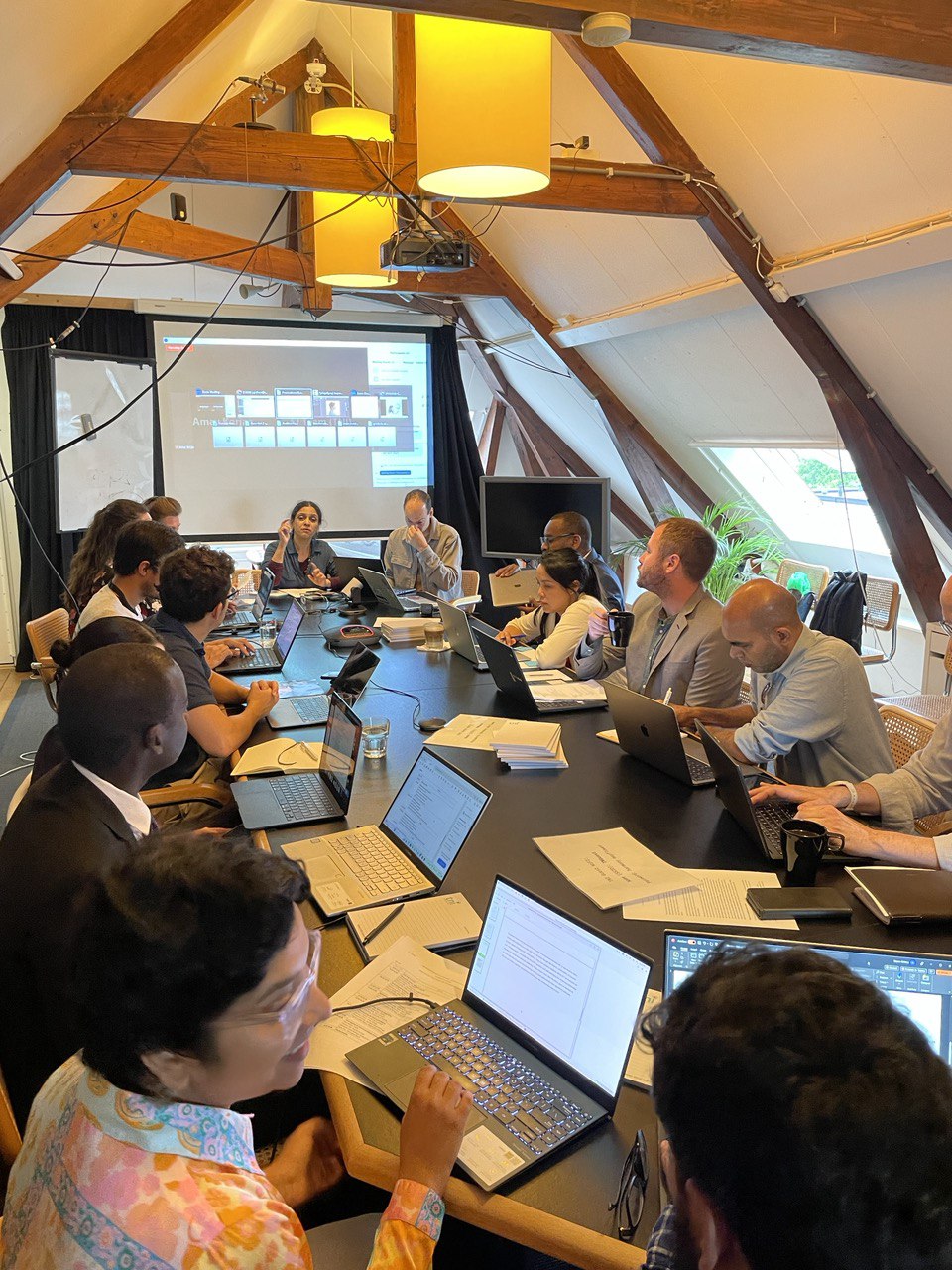
 KEY MILESTONES
KEY MILESTONES
- Centering the political economy critique in mainstream AI governance discourse: To explore new institutional arrangements to advance AI as a catalyst for generative and accountable economies and societies, we hosted an international roundtable in Amsterdam on ‘Reframing AI Governance through a Political Economy Lens’. The roundtable brought together researchers and practitioners invested in critical theoretical analysis of the AI paradigm. Drawing on insights from this roundtable, we responded to a call for papers on ‘Global AI Governance’ by the UN Tech Envoy's office.
- Furthering gender equality and diversity in the AI lifecycle: We actively engaged in global efforts to promote responsible AI practices. We contributed to a project undertaken by the Global Partnership on Artificial Intelligence (GPAI) working group on Responsible AI, where we provided actionable recommendations for OECD member states to incorporate substantive equality approaches throughout the AI lifecycle, grounded in gender equality and meaningful diversity.
- Advocating against knowledge monopolies: We engaged in global biodiversity policy discussions, particularly in relation to the Convention on Biological Diversity (CBD), on the new threats of biopiracy posed by AI innovations in synthetic biology. We highlighted the need to uphold sovereign rights to benefit-sharing under the Nagoya Protocol of the CBD, in global open-access databases of digital sequence information, which are treated as ‘free-for-all’ resources by Big Agri and Big Pharma.
- Building capacities with research organizations: We engaged in a training workshop on ‘Gender and Digitality’ with the Institute of Social Studies Trust (ISST), Delhi. The workshop provided an overview of common terms used in the data and AI economy. It shed light on various issues at the intersection of gender and digitality, ranging from human rights in the digital epoch to the changing role of the state in the digital age. During the workshop, participants were also introduced to our Declaration on Feminist Digital Justice.
 WHAT’S ON THE HORIZON?
WHAT’S ON THE HORIZON?
- Introducing AI concerns into critical development policy through the Regenerative AI Network Initiative, with a focus on three specific dimensions: sustainable infrastructures, regulation and standards, and a worker and planet-centric AI transition.
- Developing a resource toolkit to inform policy debates that will include an atlas with annotated visualizations of AI harms across the Global South and a community model for risk assessment that features DIY social audits.
- Publishing a compendium, ‘Spaces and Places of AI,’ exploring the material foundations of the AI economy and analyzing the value chain to identify opportunities for disrupting entrenched power asymmetries.
- Launching a report under the GPAI project that will include recommendations for a transformative AI policy, along with actionable steps to integrate diversity and substantive gender equality considerations into AI systems.
Recommendations from the Vault
- Check out our paper on ‘Reframing AI Governance through a Political Economy Lens’ that we submitted to the UN Tech Envoy’s office for the first meeting of the Multistakeholder Advisory Body on AI.
- Read our comprehensive input discussing issues of the neocolonial dynamics of data economy, data ethics, and legal frameworks that fed into UNCTAD’s Issue Paper on Data for Development.
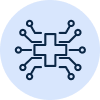 Digital Public Infrastructures
Digital Public Infrastructures
The development of digital public infrastructures (DPIs) offers a vital opportunity to enhance welfare delivery and promote inclusive citizenship while fostering public digital innovation, e-commerce, and financial services in emerging digital economies. As policymakers worldwide explore diverse models for building and governing these infrastructures with multistakeholder participation, we undertook an in-depth exploration of DPIs in India to gather insights on their effective governance.
 KEY MILESTONES
KEY MILESTONES
- Assessing India’s DPI strategies in healthcare: Our critical evaluation of India’s approach to digitalization included an analysis of historical trends in India’s digital journey, the role of private players, and the shifting role of the state. We studied this digital transformation through the lens of an ethical framework in an attempt to analyze trade-offs made by the state.
- Advocating against the commodification of essential services: Our advocacy with the T20 engagement group of Brazil G20, 2024, discussed the implications of platformized welfare service delivery. We highlighted the increasing commodification of healthcare services, the shrinking space for civic action, and the dilution of rights. We also advocated for a community approach to data governance, paving the way for equitable distribution of the benefits accruing from data.
- Contributing to the discourse on public-oriented data governance: A burgeoning health data market requires trustworthy and ethical data governance mechanisms at the global stage. We participated in a panel discussion that explored the role of the World Health Organization in safeguarding individual and collective data rights, particularly in the Global South.
 WHAT’S ON THE HORIZON?
WHAT’S ON THE HORIZON?
- Conducting an event on ‘Inclusive Innovation and Digital Economies’ to discuss the concerns around the design and deployment of DPIs in the Global South.
- Carrying out various case studies in India on DPIs in healthcare, agriculture, and urban mobility.
Recommendations from the Vault
- Check out this policy brief analyzing the pitfalls of platformization of public health services and the subsequent commodification of healthcare.

Public Sphere and Content Governance
In a communicative sphere increasingly dominated by private digital platforms, our research and advocacy efforts have focused on intersectional feminist approaches to content governance and information integrity. This year, we made significant progress through a range of strategic engagements.
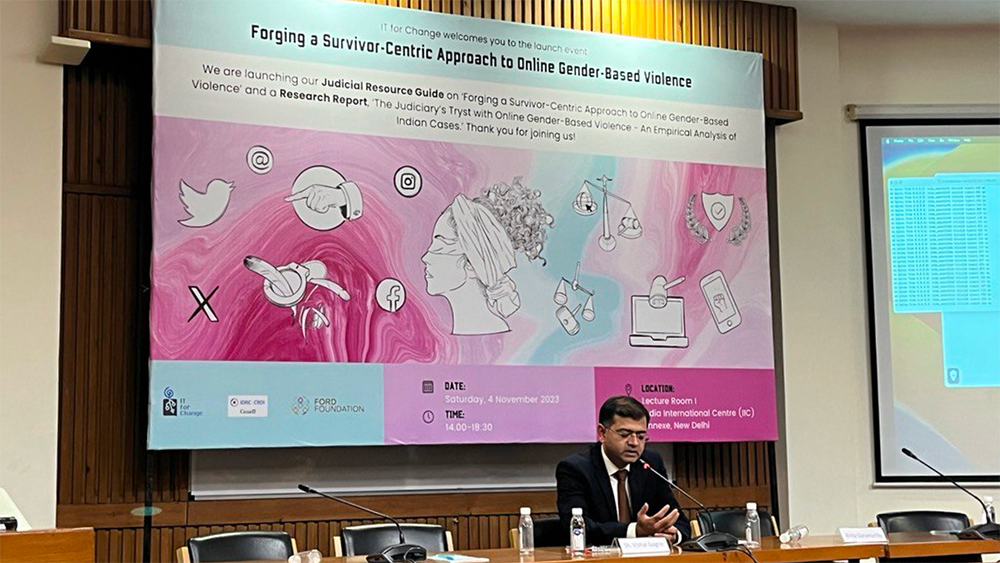
 KEY MILESTONES
KEY MILESTONES
- Engaging with UNESCO’s Model Law on Platform Accountability: A major facet of our research focused on safeguarding freedom of expression and access to information online. We engaged with UNESCO, providing detailed feedback on Draft 2.0 of its ‘Guidelines for Regulating Digital Platforms,’ calling for stronger application of the UN Guiding Principles on Business and Human Rights, particularly for platform accountability in the Global South.
- Impacting national platform accountability legislation: We reached a significant milestone in our work on platform accountability this year with the release of our research report and judicial resource guide on online gender-based violence (OGBV). The report sparked nationwide discussions on legal reforms, analyzing how Indian courts handle OGBV cases and offering actionable recommendations. Key areas of focus include recognizing the seriousness of OGBV, protecting victims' privacy, and enforcing stronger accountability measures for online platforms. This work has laid a foundation for future advocacy.
- Promoting intersectional development research: We contributed to an analysis of intersectional approaches in development research for a project undertaken by the International Development Research Centre (IDRC). While the project did not focus on the findings of our Twitter study, it highlighted the methodology we employed. Specifically, we emphasized our sampling strategies, which considered factors such as caste, religion, education, and other parameters to understand gender locations through an intersectional lens.
- Broadening the discourse on freedom of speech: We presented a paper in a workshop organized by the European Society of International Law (ESIL), delving into the evolving role of social media platforms as speech regulators. The paper critically examines the privatization of public values — such as fairness — without public institutional oversight, particularly in different socio-political and cultural contexts.
 WHAT’S ON THE HORIZON?
WHAT’S ON THE HORIZON?
- Thinking about information integrity from a techno-political standpoint through a project focusing on developing a bottom-up vision of what it means to create a democratic digital communication space.
- Continuing our involvement with international forums on global regulatory discussions, such as the Information for Trust Knowledge Community and the Forum on Information and Democracy.
Recommendations from the Vault
- Explore this case study, ‘Intersectional Frames in Digitalisation Research: Revisiting a Study by IT for Change About Misogynistic Trolling Online’ for a reflexive analysis of our previous study on misogynistic trolling online.
- Check out our submission to the Forum on Information and Democracy’s AI Working Group on, ‘AI and its Implications on the Information and Communication Space.’
- Read this book chapter, ‘Justice in the Post-public Sphere: The New Challenge for Global Communication Governance,’ which examines how the economy of algorithmic surveillance has overshadowed social interaction in the age of digital capitalism, and proposes a new roadmap for communicative constitutionalism.

Prakriye Field Center for Community Informatics and Development
Through our Mysuru-based field center, Prakriye, we implement innovative techno-social strategies to address the gender digital divide impacting rural women and girls. This year, we worked in 60 villages, focusing on digital media literacy, enhancing community learning spaces, and fostering women's participation and leadership in local governance.
PRAKRIYE IMPACT AT A GLANCE
| 110+ | Screenings held in operational villages |
| 1,700+ | Women, men, adolescent boys, and girls reached through screenings |
| 15,000+ | Individuals benefited from Namma Mahithi Kendras |
| 1,500+ | Welfare claims processed through Namma Mahithi Kendras |
| 110+ | Men participated in awareness sessions on gender issues and women’s rights |
| 1,100+ | Subscribers reached through IVR messages on public services and entitlements |
| 170+ | Audio messages produced on important themes |
| 25+ | Kishori Media Champions mentored |
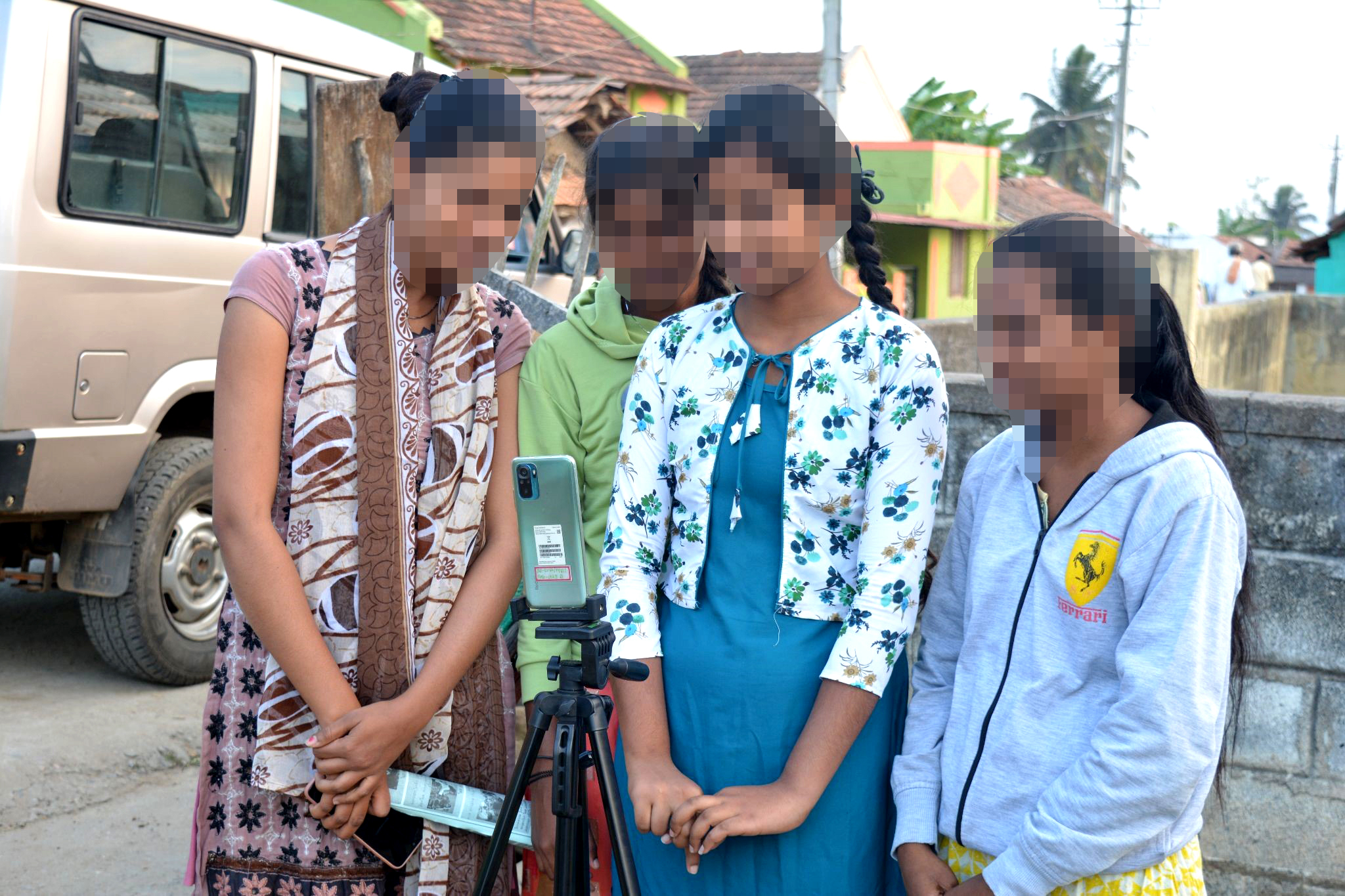
 KEY MILESTONES
KEY MILESTONES
- Strengthening our grassroots knowledge ecosystem: Our network of seven women-owned information centers, known as Namma Mahiti Kendras, spans 60 villages across two blocks in Mysuru district. We reached over 15,000 people, providing vital information that helped individuals access welfare schemes like pensions, subsidies, scholarships, jobs, housing, and cattle sheds. The Sakhis (infomediaries) who run the centers, along with women's collectives, organized eight public meetings for grievance redressal with government officials, benefiting over 240 women.
- Collectivizing women through the Namma Maathu Forums: We brought together 850 women from 24 villages for our Namma Maathu Forums, facilitating discussions on gender issues and women’s rights. These Forums provided a platform for women to find their voice, help assert their identity within their families, and negotiate for greater freedoms and autonomy. As a result of our efforts, many women accessed their local Panchayat for the first time to claim services. Further, women from one of the villages negotiated with their families to take a holiday, and traveled to Mysusru city for a day!
- Addressing gender-based violence: We trained 31 Anganwadi workers in gender-sensitive counseling methods to assist survivors of gender-based violence.
- Enhancing community outreach through audio-visual resources: We reached over 2,800 rural women, men, and adolescents through our community film screenings and Interactive Voice Response (IVR) messages. The screenings proved vital in promoting gender-sensitive values and sparking discussions on critical topics like girls' education and women's leadership.
 WHAT’S ON THE HORIZON?
WHAT’S ON THE HORIZON?
- Conducting a strategic review to reflect on our journey and realign our priorities, focusing on strengthening intergenerational support systems.
- Building solidarity among women and adolescent girls by enhancing our Namma Maathu Forums of women’s collectives.
- Strengthening the management committee of the Namma Mahiti Kendras and transforming these centers to also double up as Kishori hubs. We will also launch DreamDesks: a new initiative to support Kishoris (adolescent girls).
- Expanding our media literacy and life skills training to include a comprehensive suite of resources and activities to support adolescent girls’ academic pursuits and career aspirations.
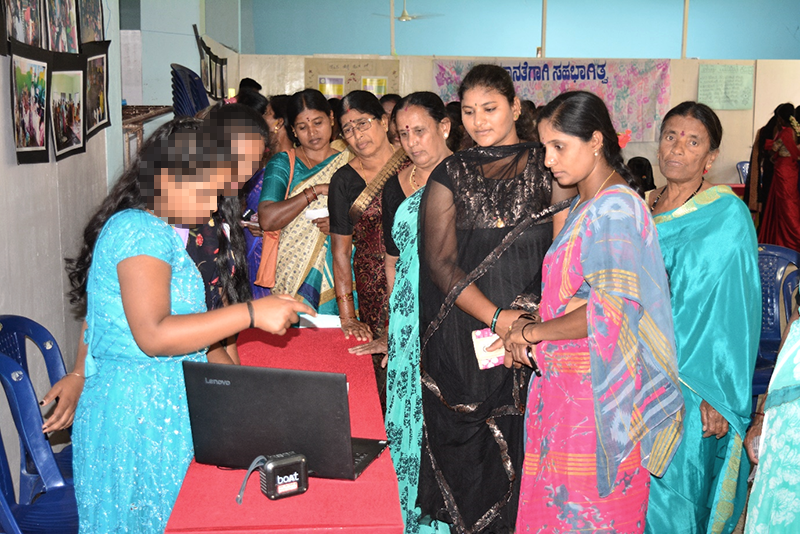

Education and
Technology
This year, our work with schools continued to emphasize the potential of public educational technologies to strengthen the public school system. We engaged with various stakeholders — including students, teachers, and government officials — across several key areas: building teacher capacity, field-level engagement, conducting action research, developing Open Educational Resources (OERs), and contributing to educational discourse.
IMPACT AT A GLANCE
| 6,000+ | Adolescent girls reached |
| 2,900+ | Teacher capacities built |
| 1,000+ | Open Educational Resources created |
| 145+ | Schools partnered with to establish Kishori Clubs |
| 45+ | Workshops covered |
| 20+ | Academic institutional collaborations fostered |
| 8 | Courses conducted |
| 7 | States covered |
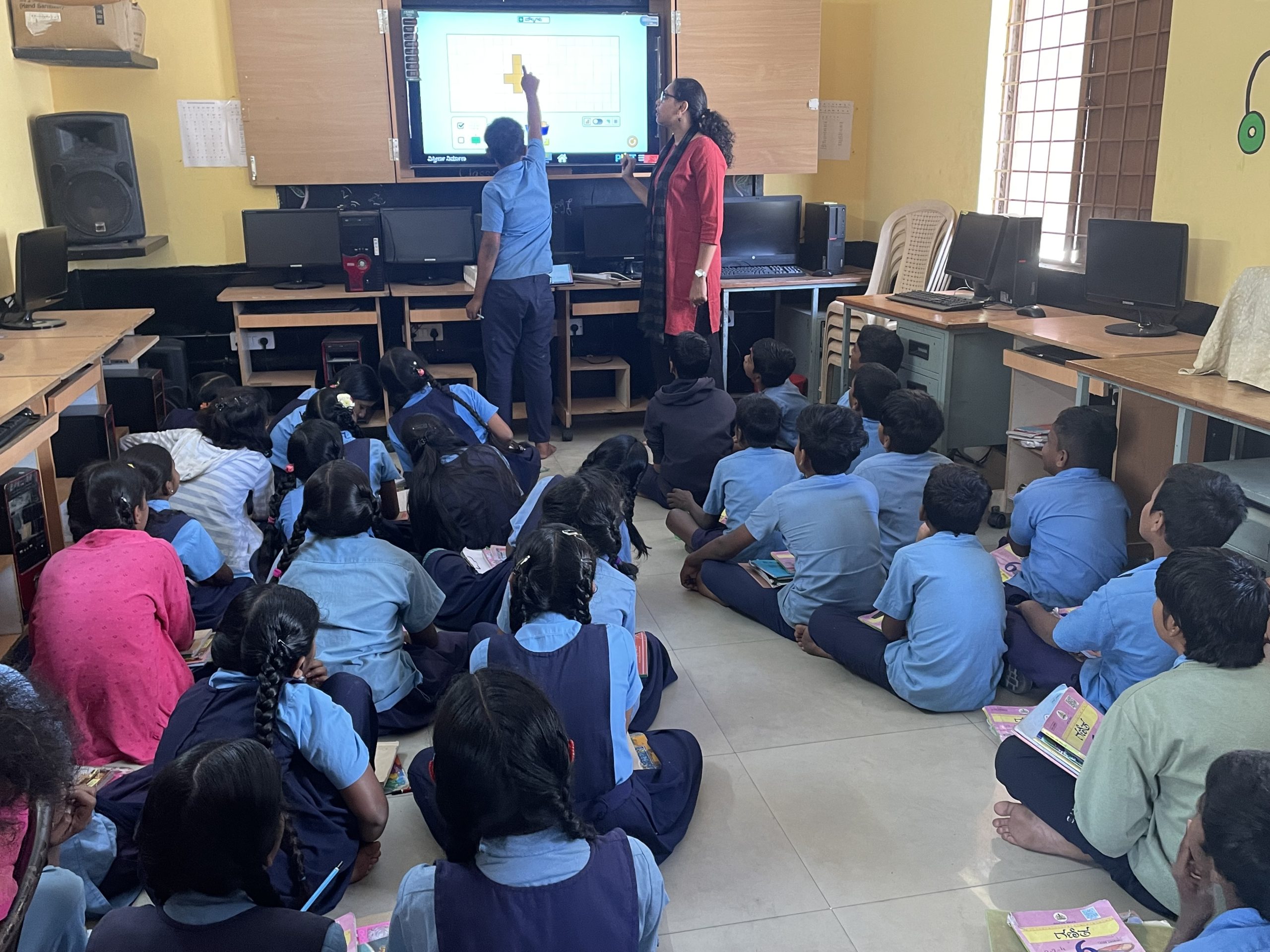
 KEY MILESTONES
KEY MILESTONES
- Empowering government school Urdu teachers through FOSS and OERs: In collaboration with Bengaluru North District Institute for Education and Training (DIET), we conducted workshops on creating OERs in Urdu for government school teachers. Approximately 75 teachers participated, learning to type in Urdu and translate stories into the language. Notably, over 25 teachers brought their personal laptops to have the Ubuntu Free and Open Source Software (FOSS) custom distribution installed. This workshop was a milestone for us, as it involved working with a cohort of teachers from an often underserved minority community.
- Partnering with Kerala Infrastructure and Technology for Education (KITE): We forged a successful collaboration with KITE, undertaking unique and innovative initiatives together. We conducted studies on two of KITE’s pioneering programs — E-Language Lab and Little KITEs — that demonstrate effective technology integration in education at a systemic level.
- Promoting tech integration by empowering educators: We transitioned from a facilitator-led approach to a teacher-centric model in our ‘Technology Integration for Equitable Education’ (TIEE) program. This has led to teachers incorporating our OERs into their syllabi. Further, we expanded the project’s scope in Bengaluru South 3 block, by offering subject-focused Teacher Professional Development (TPD) workshops, digital literacy training for headmasters and Cluster Resource Persons, and hands-on support to school staff to activate underutilized technology in schools.
- Upscaling avenues for adolescent girls’ empowerment: Beginning with a pilot in three government schools in Bengaluru, we scaled up the Kishori Club program to 146 residential and non-residential government schools in Mysuru and Kalaburagi districts. On the digital front, we designed an open online course, ‘Career Guidance Course for Adolescent Girl Empowerment,’ and a video series on cyber safety, ‘Girls Adda.’
 WHAT’S ON THE HORIZON?
WHAT’S ON THE HORIZON?
- Conducting techno-pedagogy workshops to help teachers comprehend and experience digital story-based pedagogy.
- Piloting an audio story-based program in Anganwadi centers in Jharkhand.
- Expanding the TIIE project, specifically targeting two rural and socio-economically disadvantaged blocks in Mysuru district.
- Collaborating with English teachers in Urdu-medium schools in Bengaluru North district as part of our project, ‘Studying the Scaling of TPD for English Language Learning.’
- Implementing an AI-driven, smartphone-based FOSS for assisting English language teachers in assessing students' listening and speaking skills.
- Expanding Kishori Clubs to two more districts this year, with the aim of eventually covering all districts across the state of Karnataka.
Recommendations from the Vault
- Read UNICEF’s report, ‘Empowering Adolescents with Future-Ready Skills Study on the Little KITEs Programme,’ based on a study we conducted on Kerala’s Little KITEs program.
- Explore our study exploring the use of Open Educational Practices at Open Universities.
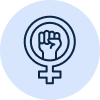 Feminist Perspectives on the Digital Economy
Feminist Perspectives on the Digital Economy
While the digital economy is widely hailed as a transforming force in the labor participation of informal economy workers, its actual form and practices are chequered. This year offered us the opportunity to expand the scope of our contributions to emerging debates and practices on alternative digital imaginations and futures for workers in the current context of a techno-capitalist marketplace. We adopted feminist perspectives to unpack gendered participation in the gig economy, particularly focusing on women’s exclusion from digital marketplaces, as well as the role they play in undergirding men’s participation in gig work.
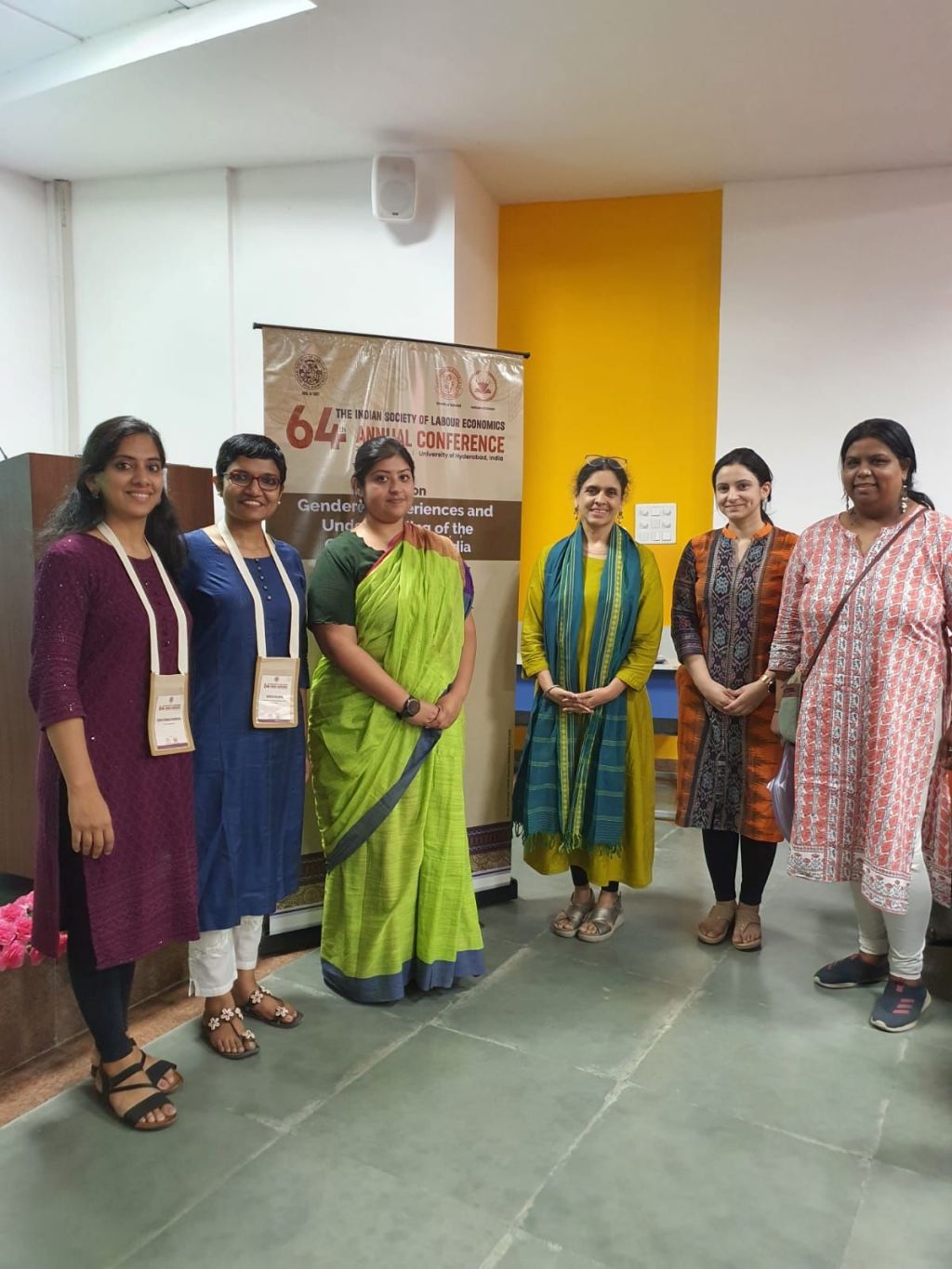
 KEY MILESTONES
KEY MILESTONES
- Researching women MSMEs in the Global South: We continued our research on understanding the implications of digitalization of Micro, Small, and Medium Enterprises (MSMEs) on women, by making connections between MSME digitalization, the political economy of the digital marketplace and global value chains. Our investigation reveals how Big Tech’s control over digital infrastructure traps MSMEs in a cycle of dependence, creates persistent barriers to their digital inclusion, and reinforces existing social power structures within the digital economy.
- Strengthening feminist perspectives on labor: We worked to promote feminist approaches to labor issues in the digital economy. We participated in an ILO stakeholder consultation workshop on ‘Understanding and Improving Women’s Work on Digital Labor Platforms,’ and in the 2023 UN Trade Forum to examine e-commerce from a gender and development perspective. We also participated in the 64th Annual Conference of the Indian Society of Labour Economics, with a presentation titled ‘Beyond the Gig: Reimagining Economies for Feminist Possibilities.’
- Contributing to feminist scholarship: We presented a paper titled, ‘The Unbearable Lightness of Being a Gig Worker’ at an international conference in Amsterdam. The paper analyzes India’s burgeoning on-demand platform economy through the prism of feminist social reproduction theory.
 WHAT’S ON THE HORIZON?
WHAT’S ON THE HORIZON?
- Publishing the final country reports and synthesis report from our research on the digitalization of MSMEs and its impact on women’s economic participation.
- Releasing our report on algorithmic management of workers in the platform economy, along with our proposal for horizontal regulation of algorithms across all workplaces, in collaboration with the Center for Labour Studies at NLSIU.
- Furthering our engagement in the Beijing+30 Consultation Process, focusing on economic justice, social protection, decent work, and gender equality.
- Launching the second edition of the National Gender Fellowships on Gender and the Digital Economy to support early-career women researchers across India in conducting original research on digital inclusion.
- Initiating a series of international think pieces to promote cutting-edge scholarship on feminist perspectives related to digital inclusion and infrastructure.
Recommendations from the Vault
- Explore our compendium, ‘Gender Perspectives on the Digital Economy,’ developed from the contributions of fellows from the inaugural edition of the National Gender Fellowship.
- Read this essay, ‘Fixing Platform Power,’ that explores the impact of digital technologies on women workers in India.
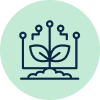 Digitalization in Agriculture
Digitalization in Agriculture
This year, our work on digital infrastructures was shaped by a productive engagement with the concept of the digital commons and alternative platform models in agriculture. We collaborated with scholars, cooperative members, tech designers, practitioners, and policymakers to envision an alternative digital future for agricultural digitalization. This initiative focused on agenda setting and blueprint design, with the principle of cooperativism at its core.
 KEY MILESTONES
KEY MILESTONES
- Broadening the discourse on alternative platform models: In the run-up to the Roots of Resilience conference, we co-hosted a roundtable to bring together diverse stakeholders, including traditional cooperatives, start-ups, youth cooperatives, women’s collectives, progressive tech community members, and officials from the Kerala government to build an active community around and foster future-looking discussions on alternative platform models. The roundtable helped define the contours of digital platform models that privilege data commons, shared ownership, and democratic governance.
- Building out the field through research: We are developing a theoretical blueprint for a federated data cooperative model for SEWA’s farmer collectives. Building on this effort, we co-authored a paper with SEWA titled, ‘Re-imagining the Platform Firm: Lessons and Design Blueprints from SEWA’s Data Cooperative Experiment,’ which was presented at the 8th ILO Conference on Regulating Decent Work in Geneva.
- Expanding our engagement in agricultural innovation: We participated in a roundtable on ‘Digital Innovations to Support Sustainable Agriculture Value Chains in India,’ where we contributed insights on alternative imaginations of women farmers’ role in digitalization initiatives — as designers and data stewards.
 WHAT’S ON THE HORIZON?
WHAT’S ON THE HORIZON?
- Developing techno-design blueprints that outline considerations for platform design for our partners working on digitalization of agriculture.
- Building a new ‘Co-op Tech’ community that brings together designers, engineers, practitioners, and scholars working in the cooperative technology space through a periodic newsletter.
Recommendations from the Vault
- Read our case study on SEWA’s digitalization pilot, ‘Creating Sustainable Data Cooperatives in the Global South: Frameworks for Institutional Support.’
- Explore the transformative potential of platform cooperatives in our piece, ‘Towards Fairer Horizons: Cooperativist Solutions to Tackle Platform Capitalism.’
